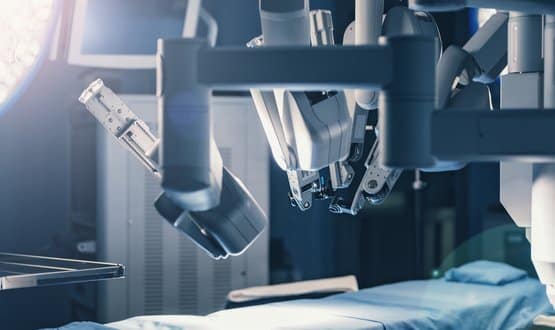NHS Highland harness the benefits of robotic surgery
- 17 June 2022

NHS Highland has been able to slash the length of hospital stays by half for some of its patients, and reduce the risk of post-surgical complications after introducing surgical robots.
The Scottish health board took delivery of its first DaVinci Xi robotic system back in August 2021 for its colorectal unit, and since then it has rolled the system out to cover both gynaecological and urological surgery specialities. Since its introduction it has carried out nearly 100 robotic-assisted surgeries (RAS).
The use of robotic surgeons has had considerable benefits for NHS Highland patients. For those undergoing open surgery the average length of hospital stay has reduced by half – four days with RAS compared to eight with conventional surgery.
In addition fewer patients are requiring critical care post-surgery, with high dependency unit admissions dropping from 70 per cent to less than 10 per cent.
Colin Richards, colorectal consultant at Raigmore Hospital, led the team who carried out the first of these operations last year.
He said: “Investing in robotics means that patients in NHS Highland now have access to world-class surgical technology and we have already shown that this is making a real and measurable difference to patient outcomes.
“Having used the system for the last six months, I would describe it as nothing short of transformative – we are able to perform surgery that is less invasive than ever before but with a level of precision that I never thought possible.”
Robotic surgery uses articulated ‘keyhole’ instruments that are controlled by the surgeon from a console next to the operating table. It means even complex surgical procedures can be done with smaller incisions, resulting in less post-operative pain and a quicker recovery.
Investment from both the Scottish government and individual health boards, has seen the use of surgical robots significantly increase in the country. With such impressive benefits felt at NHS Highland it is now hoped a national rollout will deliver similar outcomes.
The first phase of this rollout will focus on procedures that offer the greatest benefits for patients, such as colorectal, gynaecological and urological. Phase two will expand the use of robotic systems to other surgical specialities, including patients with complex benign conditions.
Richards added: “Going forward, we are working with colleagues across the country to expand the scope of robotic surgery and in the future hope more and more of our patients will benefit.”
NHS Highland is not alone in its robotic ambitions. Guy’s and St Thomas’ NHS Foundation Trust added its fourth Da Vinci robot – from Intuitive Systems – to its collection last year.




